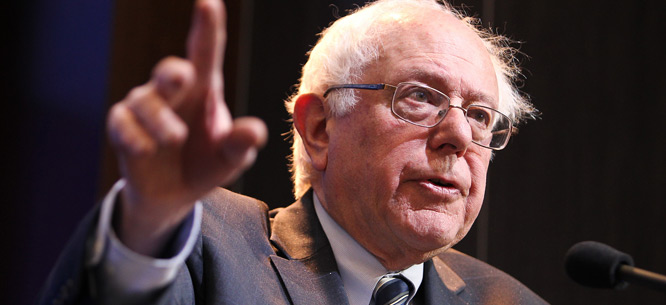Bernie’s Prospects
Bernie’s Prospects

Why is a seventy-three-year-old socialist from Vermont running for president when he surely knows he can’t win? Senator Bernie Sanders has decided to take the plunge into forbidding waters for the same reason earlier socialists campaigned for the office: to protest the current order and promote major reforms his rivals either oppose or support only when doing so juices their standings in the polls.
Sanders is going to compete in Democratic primaries so he can debate Hillary Clinton and attract media that would otherwise ignore a passionate, white-haired independent with an uncompromising left-wing agenda. Not that he has much choice: since the 1950s, the United States hasn’t had a third party capable of disseminating its anticapitalist politics to the public at large.
During the first half of the twentieth century, however, radicals like Sanders could join the Socialist Party of America, which boasted more than 100,000 members at its height. The SPA ran thousands of candidates for offices both high and low. It even managed to elect a couple of congressmen as well as dozens of mayors in locales as diverse as Milwaukee; Berkeley, California; and the little railroad town of Antlers, Oklahoma. Many of the reforms the party advocated ended up becoming law.
Beginning in 1900, Eugene Victor Debs ran five times for president, never gaining more than 6 percent of the popular vote. The charismatic former union leader crisscrossed the nation, stretching out his long arms as if to touch the admiring crowds whom he urged to destroy “the foul and decaying system” and erect a “cooperative commonwealth” in its place. But Debs’s platform also included such “immediate” demands as women’s suffrage, a progressive income tax, an eight-hour day, a ban on child labor, and a vote for the residents of the District of Columbia that no longer seem radical at all.
After Debs’s death in 1926, Norman Thomas made six of his own quixotic runs for the White House, becoming the one homegrown socialist whom most Americans could identify. A former Presbyterian minister, Thomas preached the same utopian gospel as Debs had. “I am not the champion of lost causes, but the champion of causes not yet won,” he liked to say. But Thomas also stumped for reforms that were a great deal more popular than the abolition of private property. His 1932 platform included a minimum wage, government-funded pensions for the elderly, unemployment compensation, and national health insurance. By the end of the decade, Franklin Roosevelt and the Democratic Congress had enacted each of these proposals, save the last one, which the physicians’ lobby condemned as “socialized medicine.”
Although Sanders has no leftist party machinery behind him and is too intelligent to predict a socialist future, he might be able to assume a role in the current campaign similar to that which Debs and Thomas once played. Hillary Clinton has begun to talk, very carefully, about seeking solutions to four decades of economic inequality. The Republicans who aspire to be president mostly blame the problem on broken families and lousy public schools. But Sanders is perpetually on the attack, armed with an unvarnished class-conscious message that, until the emergence of Occupy Wall Street, had long been absent from the public square. “The true greatness of a country is not measured by the sum of its millionaires and billionaires,” his senatorial website announces. “Rather, a great nation is one in which justice, equality and dignity prevail for all.”
Count on Sanders to fight for reforms that will discomfort the comfortable. He will demand a minimum wage of $15 an hour, legislation to make it easier to organize unions, a big increase in Social Security payments largely paid for by higher taxes on the wealthy, the aggressive development of renewable energy sources, and an end to the dominion of big money in politics. The senator from Vermont is one of the sponsors of a constitutional amendment that would overturn the Supreme Court’s decision in the Citizens United case. He might even call for prosecuting and jailing the people whom he blasted in a marathon 2010 speech as “the crooks on Wall Street whose actions resulted in the severe recession … whose illegal, reckless actions have resulted in millions of Americans losing their jobs, their homes, [and] their savings.”
Sanders won’t spare the Democratic front-runner either. “On the same day that Hillary Clinton visited three homes of wealthy Manhattan benefactors to raise an estimated $1 million in campaign funds,” his website announced this week, “Sen. Sanders gave a Howard University audience a sneak preview of a campaign platform that is squarely aimed at ‘the billionaire class.’ ”
As long as she runs far ahead in the polls, Clinton can avoid responding to such rhetoric. But as the unrequited longing for Senator Elizabeth Warren demonstrates, many liberal activists thrill to tough, left-wing populist talk and endorse most of the policies Sanders favors. Just as no Republican can win the White House without the enthusiastic support of the Tea Party and the evangelical right, it will be difficult for a Democrat to triumph without the kind of people who may not know much about Sanders but will like much of what he says. They may pressure Clinton to echo it, too.
A century ago, Debs told Americans it was “better to vote for what you want and not get it than to vote for what you don’t want and get it.” The raspy-voiced Vermonter, who still speaks in a Brooklyn accent, will base his campaign on that same logic. Bernie Sanders is not going to win. But in losing he may do more to advance his causes than if he had never run at all.
Michael Kazin is co-editor of Dissent.






